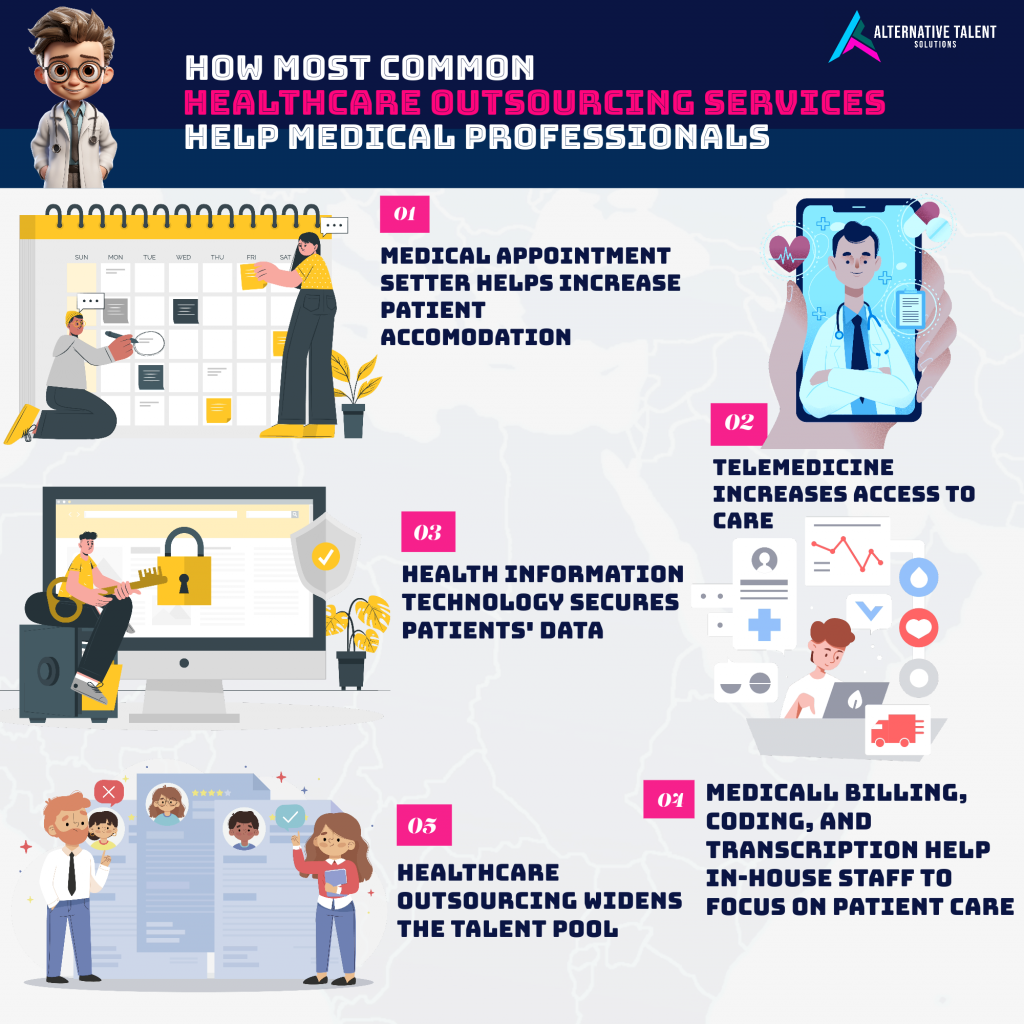Table of Contents
The healthcare sector is transforming significantly, driven by complex challenges and opportunities. Adopting common healthcare outsourcing services is among the most effective strategies in this landscape. By partnering with specialized providers, hospitals and healthcare organizations can significantly reduce the workload on their staff, leading to enhanced patient care and operational efficiency.
Challenges Hospitals Face as More Healthcare Workers Quit
In recent years, the healthcare industry has witnessed an alarming increase in the turnover of healthcare workers. According to a 2021 study, the average turnover rate in healthcare jobs reached approximately 20%, a number that has been steadily climbing. This exodus has left hospitals scrambling to maintain quality care with fewer resources, underscoring an urgent need for sustainable solutions.
Reasons Behind the Shortage of Healthcare Workers
Stress and Heavy Workload
Healthcare workers face immense stress and workload, particularly in high-pressure environments like emergency rooms and intensive care units. A survey revealed that over 60% of healthcare professionals report experiencing burnout, primarily due to excessive workloads and the emotional toll of patient care.
Risk of Catching COVID-19
The COVID-19 pandemic has added another layer of risk for healthcare workers. As of 2022, a significant percentage of healthcare professionals have been directly impacted by COVID-19, either through personal infection or the care of infected patients. This risk has contributed to the hesitancy of potential employees to join the healthcare workforce.
Changes in Healthcare Laws
Recent changes in healthcare laws, including the Health Insurance Portability and Accountability Act (HIPAA), have introduced new complexities into healthcare administration. Compliance with these regulations requires additional staff training and resources, further stretching thin hospital resources.
Increasing Number of Older People
The United States is experiencing a significant demographic shift, with the population of older adults growing unprecedentedly. This change is primarily driven by the aging of the Baby Boomer generation—those born between 1946 and 1964—who are now entering their senior years.
Implications of an Aging Population
- Increased Demand for Healthcare Services
- Challenges in Healthcare Workforce
- The rise in Chronic Health Conditions
- Impact on Medicare and Social Security
- Need for Long-term Care and Supportive Services
- Shift in Public Policy and Planning
The rise in the number of older Americans presents challenges and opportunities for the healthcare system. Addressing these challenges requires strategic planning and resource allocation to ensure the aging population receives the care and support they need.
How Outsourcing in Healthcare Helps Avoid Overworking Staff

Outsourcing in hospitals is a big help. It takes some jobs off the staff’s plate, especially when there’s a lot to do and not enough people to do it. Here’s how it makes things easier for the hospital staff:
Ways Healthcare Outsourcing Aids Staff
- Less Paperwork
- Getting Expert Help
- Better Patient Care
- Less Stress for Workers
- Easy to Adjust
- Saves Money
- Following Rules Better
Outsourcing in hospitals is a great way to help the staff focus on what’s most important – caring for patients. It brings in outside help for some jobs, makes things less stressful, and can even save money.
Scheduling Appointments to Better Serve Patients
A prime example of beneficial outsourcing is the management of appointment scheduling. Outsourced customer service teams can handle the influx of calls and appointment requests, reducing wait times and improving patient satisfaction. This efficiency streamlines the process and ensures that healthcare workers can attend to patients without the stress of managing a hectic schedule.
Outsource Medical Billing, Coding, and Transcription for Better Patient Care
Medical billing, coding, and transcription are critical yet time-consuming tasks that can be effectively outsourced. Healthcare outsourcing companies specializing in these areas bring expertise that ensures accuracy and compliance with insurance portability and accountability standards. This precision reduces the likelihood of billing errors and speeds up the insurance claims process, ultimately benefiting patients and healthcare providers.
Benefits of Outsourcing Medical Billing and Coding
- Enhanced Accuracy and Compliance: Outsourcing companies specializing in medical billing and coding are well-versed in the latest healthcare regulations, ensuring compliance with standards like the Health Insurance Portability and Accountability Act (HIPAA). This leads to fewer billing errors and denials, benefiting patients through smoother service.
- Improved Revenue Cycle Management: Efficient handling of billing and coding accelerates the revenue cycle, reducing the time between service delivery and payment collection. This financial efficiency can be redirected into improving patient care services.
- Reduced Administrative Burden: By outsourcing these functions, healthcare providers can reduce the administrative load on their staff, allowing them to focus more on patient care and less on paperwork.
The Impact of Outsourced Transcription on Patient Care
- Timely and Accurate Medical Records: Accurate transcription is vital for maintaining patient records. Outsourced transcription services ensure timely and precise documentation of patient encounters, which is crucial for effective treatment planning and follow-up care.
- Enhanced Collaboration Among Healthcare Providers: With accurate and promptly transcribed records, healthcare providers can collaborate more effectively, ensuring a higher standard of patient care.
- Scalability and Flexibility: Outsourcing transcription allows healthcare facilities to scale their operations up or down based on demand, providing flexibility and efficiency in managing patient data.
Expanding Care Through Telemedicine
Examples of Telemedicine
One of the most transformative aspects of healthcare outsourcing is expanding telemedicine services. Telemedicine has proven invaluable, especially in the wake of the COVID-19 pandemic, offering examples such as:
- Virtual Consultations: Patients can consult with healthcare providers via video conferencing, reducing the need for in-person visits.
- Remote Monitoring: Patients with chronic conditions can be monitored remotely using various devices, allowing continuous care without frequent hospital visits.
- E-Prescriptions: Electronic prescribing enables healthcare providers to send prescriptions directly to pharmacies, simplifying patient medication procurement.
- Mental Health Services: Teletherapy sessions provide mental health services to patients from the comfort of their homes.
- Digital Health Education: Patients can access various health-related information and guidance through online platforms.
These telemedicine services extend the reach of healthcare providers and make medical services more accessible and convenient for patients.
Using Health Information Tech to Keep Patient Data Safe
Examples of Healthcare Technologies
In the digital age, protecting patient data is paramount. Outsourcing partners with advanced health information technology is crucial in safeguarding this data. Examples of these technologies include:
- Electronic Health Records (EHRs): Providing a digital version of a patient’s paper chart, making information available instantly and securely to authorized users.
- Secure Data Exchange Systems: Ensuring patient information is securely and efficiently shared among healthcare providers.
- Cybersecurity Solutions: Protecting sensitive patient data from cyber threats and ensuring compliance with the Health Insurance Portability and Accountability Act (HIPAA).
- Patient Portals: Secure online platforms where patients can access their health information and communicate with their healthcare providers.
How Outsourcing Brings More Skilled Workers
Outsourcing in healthcare addresses staffing shortages and brings in a pool of skilled workers specialized in diverse areas of the healthcare sector. These experienced professionals, ranging from medical coders to IT specialists, enhance the capabilities of healthcare organizations, enabling them to offer a broader range of offshore outsourcing services in the Philippines and maintain high standards of patient care.
Improve Your Healthcare Business by Outsourcing
In conclusion, healthcare outsourcing services are a powerful tool for hospitals and healthcare organizations looking to reduce costs, improve efficiency, and focus on patient care. By partnering with the right outsourcing companies in the Philippines, healthcare providers can overcome the challenges of staffing shortages, administrative overload, and the ever-evolving landscape of the global healthcare industry. Embracing business process outsourcing is not just a means to mitigate current challenges; it’s a strategic move towards a more sustainable and patient-centric healthcare model.







